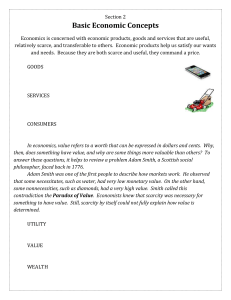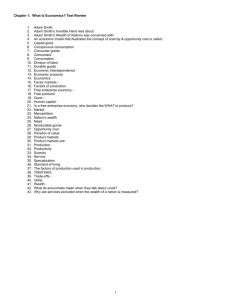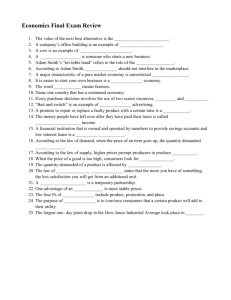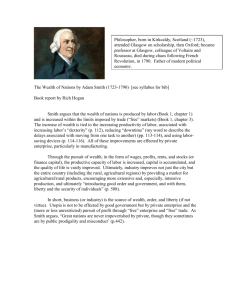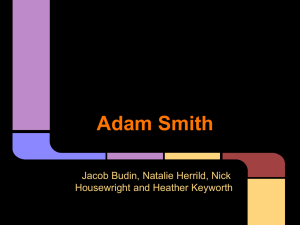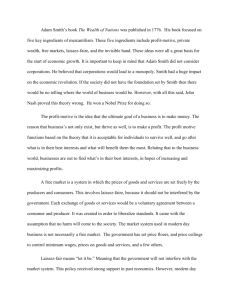The Wisdom of Adam Smith
advertisement
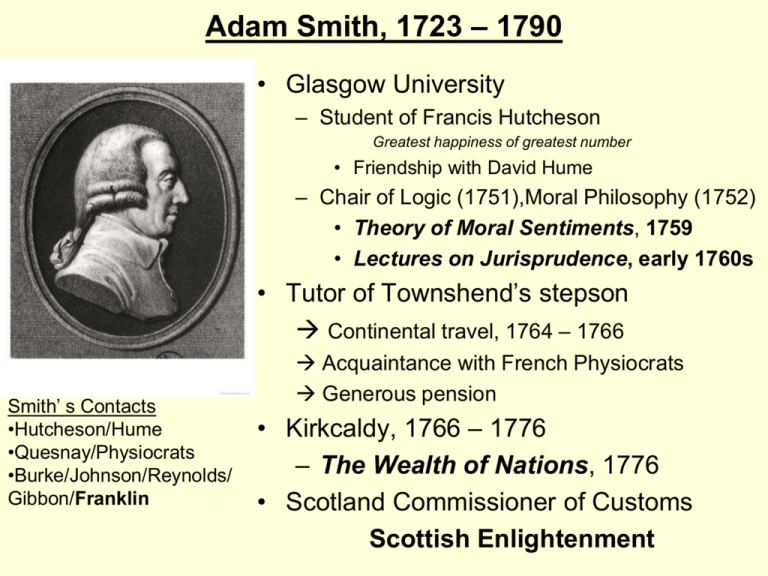
Adam Smith, 1723 – 1790
• Glasgow University
– Student of Francis Hutcheson
Greatest happiness of greatest number
• Friendship with David Hume
– Chair of Logic (1751),Moral Philosophy (1752)
• Theory of Moral Sentiments, 1759
• Lectures on Jurisprudence, early 1760s
• Tutor of Townshend’s stepson
Continental travel, 1764 – 1766
Smith’ s Contacts
•Hutcheson/Hume
•Quesnay/Physiocrats
•Burke/Johnson/Reynolds/
Gibbon/Franklin
Acquaintance with French Physiocrats
Generous pension
• Kirkcaldy, 1766 – 1776
– The Wealth of Nations, 1776
• Scotland Commissioner of Customs
Scottish Enlightenment
The Visions of Adam Smith
• Self – regulating system of markets
• Virtuous circles … Progress
• Rule of Law/Property Rights Productivity Rule of Law
Inclusive Political Institutions Inclusive Economic Institutions
• Division of Labor Extent of Market Division of Labor
• Division of Labor Invention Division of Labor
• Accumulation Demand for Labor Wage Up
Extent of Market Division of Labor
Productivity Profit Accumulation
Social interdependence[Social science]—Invisible hand
Economy Solar System Social Physics
Self –regulating system of markets
Newtonian influence
The Visions of Adam Smith
• Progress!
• Material progress:
Hunters Shepherds Farmers Merchants
• Progress in governance:
Increased liberty/security of property
Feedback to material sphere
The Wisdom of Adam Smith
From The Theory of Moral Sentiments, 1759
•How selfish soever man may be supposed, there are evidently some
principles in his nature, which interest him in the fortune of others,
and render their happiness necessary to him, though he derives
nothing from it except the pleasure of seeing it.
•Anticipates General Utility Functions:
Include others’ incomes as well as own
Lets translate the rest
•It hurts to be the object of hatred and indignation; and there is
satisfaction in being beloved [and respected]. This is more important
to happiness than all the [material] advantage a person expects to get
from it.
Theory of Moral Sentiments
• Because others sympathize more with our joy than with our
sorrow, we show off our riches and conceal our poverty … it is
from this regard to the sentiments of mankind that we
pursue riches and avoid poverty.
• We want to be respectable and respected… To deserve, get and
enjoy the respect and admiration of others are the great objects
of ambition.
• There are two different ways to achieve this:
» one, by the study of wisdom and the practice of
virtue;
by the acquisition of wealth and
greatness.
» the other,
• Smith’s martial spirit
Saving hundreds of millions in China at the cost
of our little finger:
… what is it which prompts the generous upon all
occasions and the mean upon many to sacrifice their
own interests to the greater interests of others,
…counteracting the strongest impulses of selflove?. . . It is a stronger love, a more powerful
affection, the love of what is honorable and noble …
An affection more powerful than self – love!
Selfish behavior subject to norms
Wealth of Nations: Contents
• Book I Of the causes of improvement in the productive powers
of labor, and of the order to which its produce is naturally
distributed among the different ranks
– Technology and Costs: Value and Distribution Foundation of Theory
• Book II Of the nature, accumulation and employment of stock
– Money & Capital Facilitates division of labor
• Book III Of the different progress of opulence in different
nations
– History of development
– “Government policies distort the natural progress of opulence”
• Book IV Of Systems of political economy
– Mercantile system {bad}/Agricultural system of Physiocrats {unrealistic}
Free enterprise capitalism {How it might work}
• Book V Of the revenue of the Sovereign or Commonwealth
Themes in An Inquiry into the Nature and
Causes of the Wealth of Nations, 1776
Division of labor
Self Interest and Cooperation in Markets
Role of government
Foreign trade
Labor/Cost-of-production theories of value
Theory of distribution
Accumulation and progress
Adam Smith Problems?
• Inconsistency between Moral Sentiments and Wealth
of Nations?
• Skepticism of tradesmen ... and others
–
–
–
–
–
–
–
–
Workers: alienated and ignorant because of specialization
Landlords: “reap where they do not sow”
Employers: tacit conspiracy against workers
Merchants: complain only about gains of others
Manufacturers: strive for monopoly against public interest
Lawyers: multiply words beyond all necessity
MPs: support vested monopoly interest
Civil government: secures property of the rich against poor
• Important roles of government
• Defense/Justice/Public Goods…Education
• Plagiarism
Adam Smith Problems?
• Inconsistency between Moral Sentiments and Wealth
of Nations?
Theory of Moral Sentiments as foundation of Wealth of Nations
• Freedom within self-imposed ethical constraints
• Moral Sentiments explains how self-interested “economic
man” erects barriers against his own passion
generally accepted rules of behavior
• Man is formed for society with an original desire to please
– Desire for praise…and for praiseworthiness in own mind
• Rules of Justice/System of Law: preconditions for social
order
Smith: Stages of History/Development
Interactions between rule of law and economic progress
Rude State
Pasture
Agriculture
Hunter/Gatherer
Shepherd
Farmer
(American Indians) (Arabs, Tartars) (Feudal Europe)
Commerce
Merchants
(City-States)
City as
Personal Liberty
Property in
Private
Property
counterwt
+
K
Land
in
Cattle
C
to landed
i
Lack of institutions
o
n aristocracy
n
to secure private
q
g
Feudal
property
Civil
u
e
Authority
Government s
Trade &
t (Landlord Rules)
(Defend rich
Small Communities
Mfrs
against poor)
“Good Gov’t”
Nomadic
GROWTH
Few Disputes
Themes in An Inquiry into the Nature and
Causes of the Wealth of Nations, 1776
Division of labor
Increasing Returns to Scale
From An Inquiry Into the Nature and Causes of the Wealth of Nations
the division of labor is limited by the extent of the market
• To take an example, the trade of the pin-maker; a workman not
educated to this business could scarce, perhaps, with his utmost
industry, make one pin in a day… But [pin making] is divided
into a number of branches, of which the greater part are likewise
peculiar trades. One man draws out the wire, another straights it,
a third cuts it, a fourth points it, a fifth grinds it at the top for
receiving the head…Making a pin is, in this manner, divided into
about eighteen distinct operations, which, in some manufactories,
are all performed by distinct hands… I have seen a small
manufactory … but indifferently accommodated with the
necessary machinery [where ten men could] make among them
about twelve pounds of pins in a day. There are in a pound
upwards of four thousand pins of a middling size… Each person,
therefore, making a tenth part of forty-eight thousand pins, might
be considered as making four thousand eight hundred pins in a
day. But if they had all wrought separately and independently,
and without any of them having been educated to this peculiar
business, they certainly could not each of them have made twenty,
perhaps not one pin in a day…
…
Smith on Division of Labor
• All men are create equal…the Enlightenment principle
Technology differentiated employments
Technological advanceincreased division of labor
Specialization increased dexterity
Specialization eliminate set-up time
Specialization INVENTION
• With division of labor comes interdependence – exchange
– Man needs “the help of his brethren, and it is vain to expect it from their
benevolence. He will be more likely to prevail if he can interest their selflove in his favor.”
Themes in An Inquiry into the Nature and
Causes of the Wealth of Nations, 1776
Self Interest, Competition and
Cooperation in Markets
The invisible hand
• Law of Markets (Say’s Law)
– Quesnay’s Tableau Economique:
fragility, like human body (biological analogy)
– Smith: flexible wages and profits
full employment equilibrium (physical analogy)
Economic Man: Self – interest, competition and exchange
• This division of labor…is not originally the effect of any human
wisdom, which foresees and intends the general opulence to which it
gives occasion. It is the necessary … consequence of a propensity
in human nature … to truck, barter, and exchange one thing
for another.
• In civilized society [man] stands at all times in need of cooperation
and assistance of great multitudes, while his whole life is scarce
sufficient to gain the friendship of a few persons.... [M]an has almost
constant occasion for the help of his brethren, and it is in vain for him
to expect it from their benevolence only.
• It is not from the benevolence of the butcher, the brewer, or the
baker, that we expect our dinner, but from their regard to their
own interest. We address ourselves, not to their humanity but to
their self-love, and never talk to them of our own necessities but
of their advantages...
• [Value] is adjusted... by the higgling and bargaining of the
market, according to that sort of rough equality which, though not
exact, is sufficient for carrying on the business of common life.
• …the rivalship of competitors, who are all endeavoring to jostle one
another out of employment, obliges every man to execute his work
with a certain degree of exactness.
Evils of monopoly
• Monopoly...is a great enemy to good management.
• People of the same trade seldom meet together, even for
merriment and diversion, but the conversation ends in a
conspiracy against the public, or in some contrivance to
raise prices.
• As soon as the land of any country has all become private property the
landlords, like other men, love to reap where they never sowed and
demand a rent even for its natural produce.
• The monopolists, by keeping the market constantly under-stocked…sell their
commodities much above their natural price and raise their emoluments,
whether they consist of wages or profits, greatly above their natural rate…
Virtues of competition
• [W]here competition is free, the rivalry of competitors, who are all trying to
jostle one another out of employment, obliges each to work with a certain
degree of exactness...
• The natural price, or the price of free competition ... is the lowest which
can be taken, not on every occasion, but for any considerable time ...[It] is
the lowest price which sellers can commonly afford to take and stay in
business.
Themes in An Inquiry into the Nature and
Causes of the Wealth of Nations, 1776
Limited role of government
»Protect society from invasion
»Administer of justice
»Public works and public institutions
» Public roads and bridges
» Private toll canals
» Need incentive to dredge canals
The Role of Government and Laissez – Faire
• Every individual... neither intends to
promote the public interest nor knows how
much he is promoting it...[B]y directing [his]
industry in such a manner as its produce
may be of the greatest value, he intends
only his own gain, and he is in this … led by
an invisible hand to promote an end which
was no part of his intention.
Social Physics: Newton in the Economic Universe
• In context, Smith applied the invisible hand phrase to
businessman’s choice of domestic over foreign
investment.
• He may have meant to be ironic…but never mind
Smith: Need for Public Education
• In the progress of the division of labor [the worker] comes to be
confined to a few very simple operations…[He] has no occasion
to exert his understanding…and generally becomes stupid and
ignorant…The torpor of his mind renders him incapable…of
conceiving any generous, noble, or tender sentiment.
• And so, in order to avoid these deplorable results, … the most
essential parts of education – to read, write, and account – can
be acquired at an early period of life.
• For a very small expense the public can facilitate, can
encourage, and can even impose…the necessity of acquiring
those most essential parts of education…
Smith on University Education
• …In other universities the teacher is prohibited from receiving any fee
from his pupils and his salary is the whole of what he gets. His
interest is set as directly in opposition to his duty as is possible …[I]f
his emoluments are to be precisely the same if he does or does not
perform some very laborious duty, it is certainly in his interest as is
vulgarly understood, either to neglect it or, if he is subject to some
authority…, to perform it as carelessly as slovenly a manner as that
authority will permit.
• If the authority to which he is subject resides in the body corporate of
which he is a member and in which the other members are or ought
to be teachers, they are likely to make a common cause…In the
university of Oxford, the greater part of the public professors have, for
these many years, given up altogether even the pretense of teaching.
• The discipline of colleges…is in general contrived, not for the benefit
of the students, but for…the ease of the masters… No discipline is
ever requisite to force attendance upon lectures which are really
worth attending.
Smith’s Principles of Taxation
• “Equality” of burden
– At times proportional, at times progressive
• Certainty
– Transparency of direct & indirect taxes…know
what you’re paying
• Convenience
– Avoid complexities
• Economy
– Efficient collection
Themes in An Inquiry into the Nature and
Causes of the Wealth of Nations, 1776
Foreign trade
(Absolute Advantage)
Free trade
Extended market
Increased division of labor
Free trade
• … never make at home what it costs more to make than to buy... If a
foreign country can supply a commodity cheaper than we can make it,
buy from them with goods where we have an advantage.
– By means of glasses, hotbeds, and hotwalls, very good grapes can be
raised in Scotland, and very good wine can be made of them at about thirty
times the expense for which at least equally good can be brought from
foreign countries. Would it be a reasonable law to prohibit the importation
of all foreign wines, merely to encourage the making of claret and
burgundy in Scotland?
– A great empire [America] has been established for the sole purpose
of raising up a nation of customers who are obliged to buy from our
shops and producers all the goods we can supply. For the sake of
that little enhancement of price which this monopoly might afford
our producers, the home-consumers have been burdened with the
whole expense of maintaining and defending that empire…The
interest on the debt incurred is not only greater than the whole
extraordinary profit made by the monopoly of the colony trade, but
greater than the whole value of that trade...
Smith:
Thoughts on American colonies
Cost – benefit analysis: value of taxes vs. cost
of defeating and policing the colonies
• If retain colonies, should give them (and Ireland)
representation in Parliament
• Because of America’s growth potential, she would
become the “seat of the empire” in line with her
contribution to defense via taxes
• Worst case scenario for Smith:
– Lose the United Colonies
– Retain Canada, which is expensive to defend
Cost – Benefit of United Colonies
• If any of the provinces of the British empire
cannot be made to contribute towards the
support of the whole empire, it is surely
time that Great Britain free herself from the
expense of defending those provinces.
Prescient Smith
• Smith (1776): …every member of the [East India
Company] wishes to get out of the country as soon as
he can, and once he has left and carried his whole
fortune with him, is perfectly indifferent though the
whole country was swallowed up by an earthquake
• Acemoglu, Johnson, Robinson (2001):
Settler mortality Extractive Institutions Stifled Growth
Themes in An Inquiry into the Nature and
Causes of the Wealth of Nations, 1776
Theories of value
Labor theory of value
(rude state)
Place of profit
Smith’s Theory of Value
“Every man lives by exchanging becomes by some measure a merchant”
Value in use—Value in exchange—Market price…not the same
• Natural price: the central price, the price to which all prices are
continually gravitating…this center of repose…neither more
nor less than what is sufficient to pay the rent of land, the
wages of labor, and the profits of stock employed in raising,
preparing and bringing it to market cost-of-production
S—D interactions: market price reverts to natural price
• {Labor} Theory of Value
Labor cost theory / Labor command theory
• The real price of every thing, what every thing really costs to the man who
wants to acquire it, is the toil and trouble of acquiring it … What is bought
with money or with goods is purchased by labor
the labor commanded by the product from the buyer
• Labor was the first price, the original purchase-money that was paid for all
things … and its value to those … who want to exchange it for some new
productions is precisely equal to the quantity of labor which it can enable
them to purchase or command
the labor commanded by the product from the buyer
Smith’s Labor Theory of Value
• At all times and places that is dear which it is difficult to come at, or which it
costs much labor to acquire; and that cheap which is to be had easily, or
with very little labor. Labor alone, therefore, never varying in its own
value, is alone the ultimate and real standard by which the value of all
commodities can at all times and places be estimated and compared.
the labor commanded by the product from the buyer
• Smith’s theory of money: just a convenience
» Gold and silver’s values depend on the toil and trouble (labor)
of mining them.
Deer and beavers: 2 Deer = 1 Beaver
• In that early and rude state of society which precedes both the accumulation
of stock and the appropriation of land, the proportion between the quantities
of labor necessary for acquiring different objects seems to be the only
circumstance which can afford any rule for exchanging them for one another.
If among a nation of hunters, for example, it usually costs twice the labor
to kill a beaver which it does to kill a deer, one beaver should naturally
exchange for or be worth two deer.
» No return to capital?
» Later, once land is appropriated, what about rent?
Smith’s Theory of Distribution
• … the three great social classes Alternative theory of value
– Labor wage
– Capital profit
– Landlord rent
Cost-of-production theory of value
But if all value comes from labor, where do profit & rent come from?
… Rent makes the first deduction from the produce of labor employed upon
the land … and the produce of almost all other labor is liable to the like
deduction of profit.
» Exploitation? … Smith doesn’t go there
Profit rate: a multiple of the interest rate on money
… wherever a great deal can be made by the use of money, a great deal
will be given for the use of it … The progress of interest therefore may
lead us to form some notion of the progress of profit.
Net Profit = Gross Profit – Interest
{Both interest and profit fluctuate with investment opportunities}
• Rent: … High and low wages and profits are causes of high or low prices;
high or low rent is the effect of it (high or low prices) Rent not a cost
Progress Increased Demand Higher Prices Higher Rent
Accumulation, Wages, and Profits
(Accumulation: Saving and Investment by Capitalists)
Accumulation
Wage fund
Wage
(Iron Law of Wages)
Population
Productivity
Profit
Smith’s Theory of Progress
The division of labor is limited by the extent of the market
• What extends the market and increases division of labor?
Spatial factors:
• Urbanization agglomeration economies
• Location on seashores and rivers
• Improvements in transportation
Colonial settlement … imperialism
Foreign trade
Free competition
Increased domestic income
• Higher wage
• Increased population
Extent of the market Division of Labor Productivity Output
Income
Price
Smith’s Spiral of Growth
National Wealth II
National Wealth I
Employment with increased
Division of Labor
Opportunity for division
of labor
Increased Labor Supply
(Reduced Mortality)
Profit Expectations
Demand for Investment
Higher Wage
Increased interest rate
Increased Demand for
Labor
Increased Saving
Accumulation
More Adam Smith Problems
• Division of labor Alienation
… The man whose whole life is spent in performing a few
simple operations … has no occasion to exert his
understanding or to exercise his invention … [He] becomes
as stupid and ignorant as it is possible for a human creature
to become. His dexterity at his own trade [is] acquired at
the expense of his intellectual, social, and martial virtues.
… It is otherwise in the barbarous societies … every man is a
warrior.
Economic progress Moral decay & economic stagnation
• Division of labor = Increasing Returns Monopoly
Industrial Age concentration
Globalization and information age Agglomeration
and networking, not concentration
• Spiraling progress … or stationary state?
It is in the progressive state, while society is advancing toward
further acquisition, rather than when it has acquired its full
complement of riches, that the condition of the great body of
people seems to be happiest and most comfortable. It is hard in
the stationary state and miserable in the declining state.
…that full complement of riches which the nature of its soil and
climate and its situation with respect to other countries allows it to
acquire.
In a country fully peopled in proportion to what either its territory
could maintain or its stock employ … In a country fully stocked in
proportion to all the business it had to transact … the competition
would be great and the ordinary profit as low as possible.
An extinguished Sun … in the very long-run
But until then, Smith prophesies progress for the
commercial age (he does not see beyond that age).
So…Don’t worry! Be happy!
Also, Natural price of labor = “necessaries and conveniences”
– “Convenience” component of subsistence can rise with attainment
Heimann on Natural Order
• Enlightened, rational man working within laws of
nature can achieve a harmonious state without the
dictate of an overbearing authority
– scientific understanding
– and an inner impulse to contribute to universal harmony
• he intends only his own gain, and he is in this … led by an
invisible hand to promote an end which was no part of his
intention
• Intervention by an authority is disruptive of natural
harmony.
– Liberal democracy and laissez-faire economy Freedom
– Natural harmony is an ideal that is approached
– Natural harmony is self-perpetuating
• Don’t mess with enterprise economy
Adam Smith: A Summation
• Moral sentiments a first principle.
• Market coordination of self – interested individuals
“Economic man” led by an “invisible hand”
Competition Efficiency and Equity
» Guard against monopoly
• Laissez – faire!
Restricted government trumps government restrictions
• Labor theory of value … and beyond
• Progress through specialization and exchange
The division of labor is limited by the extent of the market.
Spiraling progressRule of LawSpiraling Progress
Stagnation and decline in the distant future
Smith on University Education
• …In other universities the teacher is prohibited from receiving any fee
from his pupils and his salary is the whole of what he gets. His
interest is set as directly in opposition to his duty as is possible …[I]f
his emoluments are to be precisely the same if he does or does not
perform some very laborious duty, it is certainly in his interest as is
vulgarly understood, either to neglect it or, if he is subject to some
authority…, to perform it as carelessly as slovenly a manner as that
authority will permit.
• If the authority to which he is subject resides in the body corporate of
which he is a member and in which the other members are or ought
to be teachers, they are likely to make a common cause…In the
university of Oxford, the greater part of the public professors have, for
these many years, given up altogether even the pretense of teaching.
• The discipline of colleges…is in general contrived, not for the benefit
of the students, but for…the ease of the masters… No discipline is
ever requisite to force attendance upon lectures which are really
worth attending.
